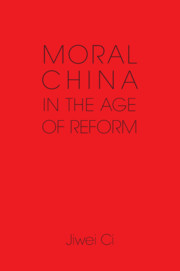Book contents
- Frontmatter
- Dedication
- Contents
- Acknowledgments
- Introduction
- 1 An Anatomy of the Moral Crisis
- 2 Political Order, Moral Disorder
- 3 Freedom as a Chinese Question
- 4 Freedom and Its Epistemological Conditions
- 5 Freedom and Identification
- 6 Neither Devotion Nor Introjection
- 7 The Insult of Poverty
- 8 Democracy as Unmistakable Reality and Uncertain Prospect
- 9 Freedom’s Unfinished Task
- 10 China’s Space of Moral Possibilities
- Index
- References
7 - The Insult of Poverty
Published online by Cambridge University Press: 05 September 2014
- Frontmatter
- Dedication
- Contents
- Acknowledgments
- Introduction
- 1 An Anatomy of the Moral Crisis
- 2 Political Order, Moral Disorder
- 3 Freedom as a Chinese Question
- 4 Freedom and Its Epistemological Conditions
- 5 Freedom and Identification
- 6 Neither Devotion Nor Introjection
- 7 The Insult of Poverty
- 8 Democracy as Unmistakable Reality and Uncertain Prospect
- 9 Freedom’s Unfinished Task
- 10 China’s Space of Moral Possibilities
- Index
- References
Summary
1
It will have become obvious by now that my concern with freedom is informed by a larger and deeper concern with agency. Viewed from within this larger and deeper concern, freedom conceived and codified in one way or another is so important because it serves as the only plausible paradigm for giving moral and institutional form to the human need for agency under modern conditions of life. Also thus viewed, China’s current moral crisis is a crisis of agency at the levels of the individual and of society as a whole, and it is only because of freedom’s indispensable role for agency under modern conditions that China’s route of escape from its moral crisis must be paved with freedom – freedom with Chinese characteristics, if you like – as one essential element among others. With agency thus serving as its framework and constant point of reference, an inquiry into freedom such as mine is naturally porous. For once we think of freedom, of China’s moral crisis, and of the nature of China’s need for freedom in this way, that is, at the deeper level of agency, there is no avoiding the need to confront other problems that have an equally weighty bearing on agency.
One such problem is that of poverty, and if in a book focused on freedom I cannot broach all significant problems that register on the horizon of agency, the problem of poverty is so important and is so much part of the moral crisis that I must devote at least a chapter to it. Doing so will allow me also to give some attention, if somewhat indirect, to the problem of equality. More importantly, it will help produce a better balance for the book as a whole, especially normatively, and thus a more precise impression of the moral impulses that drive my entire undertaking.
- Type
- Chapter
- Information
- Moral China in the Age of Reform , pp. 125 - 155Publisher: Cambridge University PressPrint publication year: 2014

